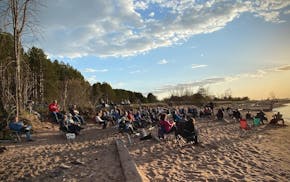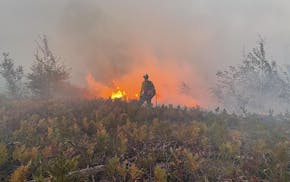The Minnesota Vikings won't be spending an extra $1.1 million to protect migrating birds from crashing into the team's new stadium.
The NFL team and the Minnesota Sports Facilities Authority on Wednesday confirmed that decision after the Minnesota Audubon Society sent out an alarm saying the structure's 200,000 square feet of glass could be a "death trap" for birds traveling in the Mississippi River corridor.
"Change glass, save birds," said the e-mail blast to members from national President David Yarnold. He noted that the stadium being built in downtown Minneapolis is less than a mile from the river where "tens of millions of birds" fly annually between their breeding and wintering grounds.
The Vikings say they're working with Audubon on lighting design and procedures but can't afford the added cost of special glass.
A year ago, the team and the Sports Facility Authority tempered some Audubon concerns with a pledge to turn off the stadium lights at night so birds wouldn't get confused. But the bird protectors want more.
The Minnesota Audubon Society cited state guidelines that require bird-safe glass on projects built with bonding money, pointing out that the state and the city of Minneapolis are covering at least half of the cost of the $1 billion Vikings project. "We know the people of Minnesota do not want their money killing birds," said Matthew Anderson, executive director of Minnesota Audubon.
But Michele Kelm-Helgen, chairwoman of the Sports Facility Authority, said the stadium design was started before adoption of the state guidelines on bird-safe glass, so it isn't subject to those rules.
"One of the design goals was to create a building that was more connected and integrated with the community than the Metrodome had been," she said. "The ability to see in and out of the stadium was what led us to the design."
She said the Sports Facility Authority has met several times with the stadium architect and builders to discuss bird safety and has agreed to "Lights Out" guidelines. As part of the society's Project BirdSafe/Lights Out program, Audubon works with building owners throughout the country to reduce bird mortality.
In the Twin Cities, migratory birds from 125 species have died when they've hit windows since 2007, Audubon estimates. Nationally, an estimated 988 million birds die annually when they inadvertently fly into buildings, according to the society.
Creating a 'death trap'?
Vikings spokesman Jeff Anderson said the team is considering Audubon's recommendations for the lighting, but "stadium construction costs continue to rise, and unfortunately, the budget does not include the additional cost required by the Audubon Society's recommended glass."
He said the Vikings and the Sports Facility Authority have agreed to use "lighting operational procedures, when possible, to mitigate bird collisions during peak migratory periods."
But using glazed glass would make the Vikings a global leader in green stadium design, Audubon's Matthew Anderson said.
"Hundreds of millions of dollars of public money is going to build this stadium, and the Vikings recently approved spending millions and millions of additional dollars to make sure the stadium is 'iconic,' " he said. "Surely they also want to make sure it's not a death trap."
Joanna Eckles of Audubon Minnesota said the society wanted the project to either meet state guidelines or the national LEED (Leadership in Energy & Environmental Design) standard for bird safety. "In the end, they did neither," she said.
Target Field, the Twins' home, which opened in 2010, won a national award in 2011 as "the Greenest Ballpark in America" from the U.S. Green Building Council.
The project also earned LEED Silver certification, making the Twins the first sports franchise to earn the imprimatur for operation and maintenance. That certification is based on independent, third-party verification of performance in five key areas of human and environmental health: sustainable site development, water savings, energy efficiency, materials selection and indoor environmental quality.
Rochelle Olson • 612-673-1747 @rochelleolson
Boy, 16, shot at YMCA in Coon Rapids

Federal funds to help restore Lake Superior sandbar

Brooks: Only you can prevent wildfires, Minnesota
Brooklyn Park police ask for help in search for man suspected of sexual assault at gunpoint

